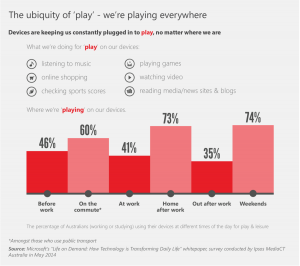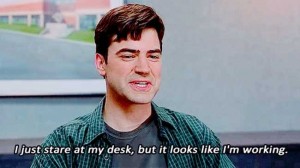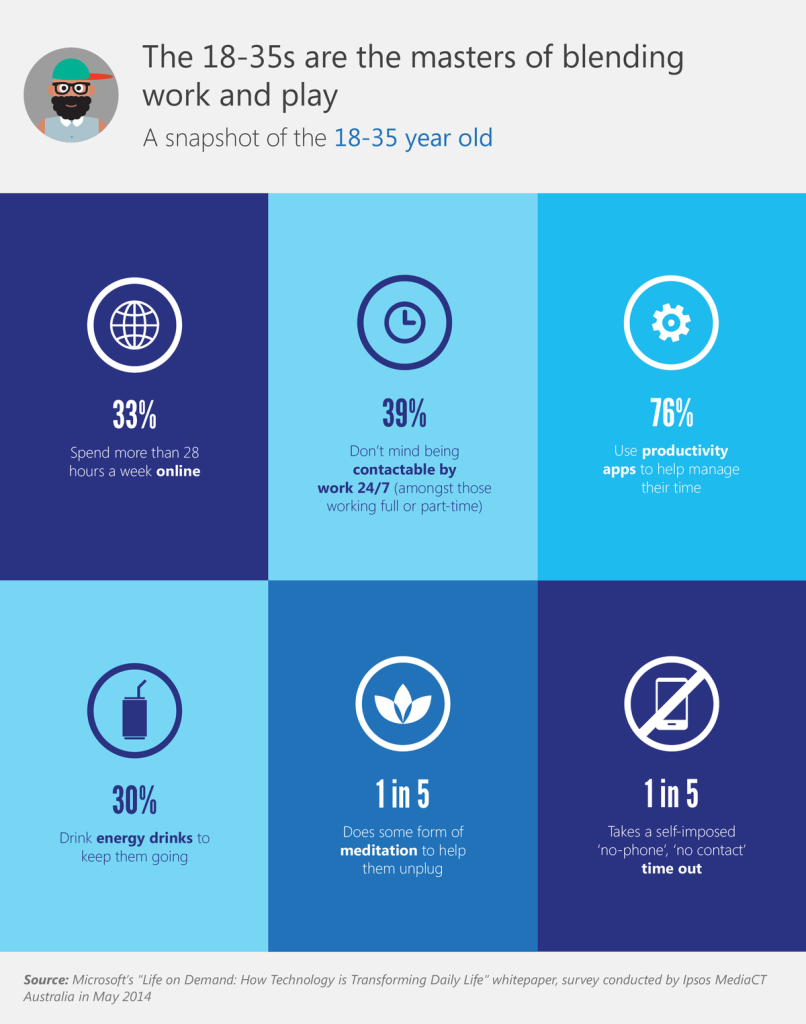The Australian Workplace of The Future Is Here and It’s a Bit Blurry | Mashable
 I have an addiction and I’m proud of it. It’s a constant need to check what’s happening on Mashable. So to be quoted in a Mashable article, is a moment to pause and give thanks. Anyway enough of that here’s the story…
I have an addiction and I’m proud of it. It’s a constant need to check what’s happening on Mashable. So to be quoted in a Mashable article, is a moment to pause and give thanks. Anyway enough of that here’s the story…
SYDNEY — Entrepreneurs have been loving their new working lives for years, while regular office workers kept on slaving away in a cubicle. The good news is here. “Nine to five” is on the way out, finally.
Last week, Microsoft released ‘Life on Demand’, a white paper which looked into the digital habits of 1027 Australians aged 18 – 65 in collaboration with global research firm Ipsos. It revealed Australians are working around the clock due to higher connectivity than ever before, signaling a change in workplace culture with blurred lines between work and play.
The report shows 93% of Australians are now connected and spend an average of 17.5 hours online a week. In a shock show of dedication, 39% of millennials are also happy to be contacted by their employer 24/7. It comes with a caveat though; they also want to be able to entertain themselves with shopping, social media and videos while in the workplace.
The data indicates a blurring of boundaries between work-life and home-life, which signals a new phase of employment. Work and play are now interchangeable in an employee’s day, with 53% of Australians completing personal tasks at work while 44% do work activities outside the traditional working hours.
“Our technology has become a constant extension of us, wherever we are — a complete departure from the way we lived life as little as five years ago,” the report stated. “Social context and location no longer determine what we do.”
“We are witnessing the beginning of the end of rigid divisions between ‘work’ & ‘play,’ and ‘work’ & ‘personal,’ as we have known them for the last 150 years. It’s happened so quickly, seamlessly and ‘naturally’ that it’s difficult to remember what life was like before,” the report continued.
Business futurist Morris Miselowski, who helped launch the paper in Sydney, spoke to Mashable about how he sees the workplace advancing and the quiet revolution so many people have missed while looking down at their device.
Miselowski agrees we are coming out of the way the workplace has worked since the industrial revolution, where the common belief was many hands make light work and the means of production were centralised. Technology has shifted the nature of work, due to the fact we can work from anywhere at anytime and Australians are embracing this change, yet employers need to keep up.
He sees a workplace bringing in skill sets when they are necessary, rather than having a person on staff “just in case”. In the next five years, Morris predicts we will see the move towards a disappearance of a physical space and the introduction of a highly “fluid” work schedule.
“In the next ten years, 60% of the tasks we will be doing we can’t even label today. The landscape isn’t clear like before,” Miselowski said. “Today’s kids, who are finishing education, are going to have six careers and 14 jobs. They will have a lifespan of 150 years and work until they are 90 years old. It will be a far more fluid workspace than now.”
So is there a possibility everyone will burn out in a few years time? With the “red cordial” phase of the past few years coming to an end, Miselowski believes a “burn out” phase would only eventuate if the consumer allows it.
The red cordial analogy refers to the hyper-active phase of consumption we have seen over the past five years, where the never-ending stream of content created a life dominated by multi-tasking. This mentality and excitement at the access to information took precedence over a deeper understanding of how to consume the appropriate information at the appropriate time.
“After an intensely rapid period of adoption of devices we’re entering a more reflective phase. We need devices and services that give the flexibility to move from one part of our life to the next, but we’re also learning how to adapt to this new way of living and negotiate some ‘tech-etiquette’ around the role of technology in our lives,” the report said.
It shows millennials are already aware of their need for time-out periods from technology, and are beginning to master technology to work for them rather than against them.
“If you allow it, technology can follow us into every corner of our lives,” Miselowski said. “But I have really seen that diminish over the past few years. We are not locked in a room [with technology], we can turn it off. We need to learn to master technology. You can use it all day or you can put it down and just step away.”
In the report, the consumers (18 – 35 year olds) accused of using technology to excess are actually the users who have learned to turn it off, demand a change to etiquette and command balance in their lives. The research showed one in five people in this age group have time-out breaks from technology or meditate away from devices. One in two people admit they take a power nap to recharge for the rest of the day and seven in ten Australians surveyed exercise weekly.

In the next decade, Miselowski said the peak-hour commute would begin to fade away as employers realise face-time does not necessarily equal productivity and as the standard nine-to-five hours blur. The employers that will gain the most success from the workplace of the future are ones that “understand that innovation is at the core of what we do”.
“Companies that are willing to be collaborative, creative, understand employees and work in a flexible nature, while constantly questioning the market place and their offering” will dominate in the next decade, Miselowski said.

Employers will begin to realise face time will means nothing.
As people work and live how they want and have a “just in time” mentality –- which can be seen through the success of apps such as Uber — businesses will need to adapt and grow in the same way or be left behind.
With technology comes globalisation and Managing Director of Telsyte, Foad Fadaghi, believes being so connected helps his every day business activities.
“I can work with people in say, San Francisco, anytime, it’s so seamless. Technology is allowing us to be everywhere at once, no matter what time of day it is here or in another country or where we happen to be,” he said in the report.
“Once only multinationals could collaborate on a global scale for business like this. Now any kid with a device can connect with other people around the world to share ideas and create new things. The implications for how we do business and innovation are huge.”
for a copy of the report:MicrosoftReport-29 7 14
